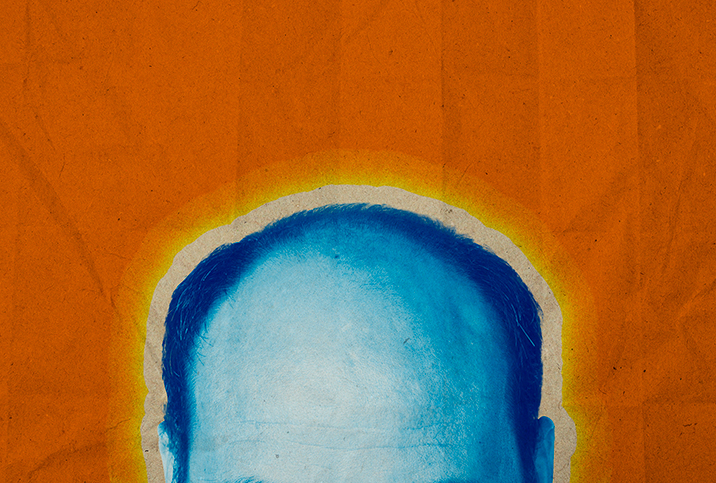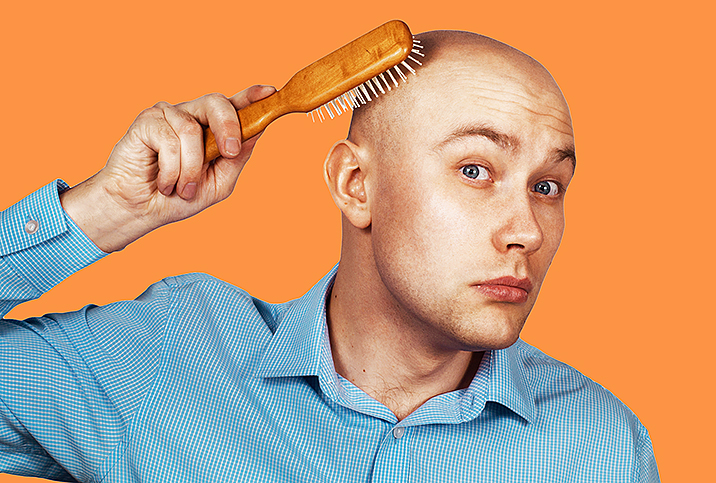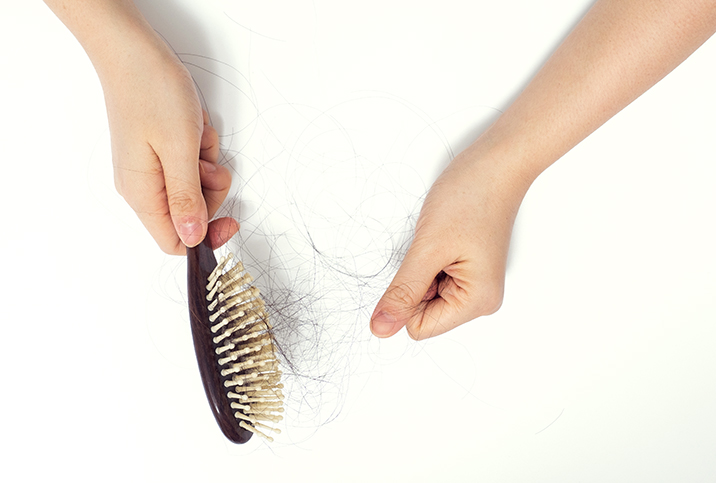Hair Loss Medications Can Affect Sexual Function

If you're a man experiencing a little thinning on top of your head, you might be tempted to blame outside factors such as the food you eat or your environment. The true culprit is a lot more boring.
Hair loss is largely hereditary, said Miguel Angel Pineda, M.D., the director of male sexual dysfunction of urology at Staten Island University Hospital in New York, a part of Northwell Health.
"You most likely can blame your parents and their parents for a receding hairline," Pineda explained.
"Specifically, male-pattern baldness [androgenetic alopecia] is related to a person's maternal grandfather's genes," said Robert Caruso, M.D., a urologist for RWJBarnabas Health in Bloomfield, New Jersey. "When dihydrotestosterone, or the DHT receptor that's present in hair follicles for men, is blocked, it results in hair loss in men."
Unfortunately, some of the only medications that can treat a receding hairline and provide hair restoration may also cause sexual dysfunction.
A (lack of) connection
As men age, it might seem like a receding hairline and a receding ability to perform in the bedroom go hand in hand. But Pineda noted there is actually no direct association between hair loss and sexual dysfunction.
"It just so happens that, for the most part, both of these issues get worse as men get older," he said.
There is no reason to think sexual dysfunction symptoms follow the start of a receding hairline, according to Ranjith Ramasamy, M.D., an associate professor at the Miller School of Medicine at the University of Miami. Most people first notice thinning hair near the temples, which then spreads to the top of the head but conveniently spares the frontal hairline, said Ramasamy, who is also the director of andrology fellowship at the Desai Sethi Urology Institute at UM.
Pineda pointed out that men who are completely bald can have normal erections, while men with a full head of hair may have erectile dysfunction.
The one factor that does seem to be intertwined with both hair and sexual function is dihydrotestosterone (DHT), which is the active form of testosterone in the body. As a 2017 article in Endocrine Reviews noted, higher levels of DHT are associated with increased libido and sexual function.
But while higher levels might get you a better erection, there's also a downside, Pineda said. Higher DHT levels are also associated with—you guessed it—hair loss. For males who are predisposed, DHT attaches to scalp receptors, resulting in a shortened hair growth cycle that eventually leads to that telltale receding hairline.
"Because androgenic alopecia is due to disruption of the normal pathway of conversion of testosterone to DHT, it makes sense that this may lead to higher rates of erectile dysfunction in men with a receding hairline," Ramasamy said.
What else causes hair loss?
Despite the link between DHT, hair loss and erectile function, Ramasamy noted there is no genetic basis that links these conditions. Instead, hair loss and any accompanying sexual dysfunction seem to be due to a complex and multisystem involvement.
For instance, along with genetics, some of the possible culprits behind male hair loss include:
- Infections
- Thyroid disease
- Immune disorders
- Medications
- Stress
All of these can impact sexual function as well. Caruso suggested certain types of sunscreens can be endocrine disruptors and may play a role. Some observational studies link facial sunscreen to frontal hair loss, according to a 2020 review in the Journal of the American Academy of Dermatology, but more research is needed to corroborate the link.
No easy fix
Unfortunately, the medications that work best to fight a receding hairline can lead to sexual dysfunction, Ramasamy explained.
The Food and Drug Administration (FDA) has approved two treatments for androgenetic alopecia: topical minoxidil (Rogaine) and finasteride (Propecia). Only minoxidil is not linked to sexual dysfunction. Finasteride is a 5-alpha-reductase inhibitor that inhibits the conversion of testosterone to DHT, which can impact sexual function.
"Well-known side effects of finasteride include decreased libido and erectile dysfunction, with some men also complaining of ejaculatory dysfunction," Ramasamy said.
If you're using finasteride, the good news is that the sexual side effects are usually not permanent and will stop upon cessation of the drug. Ramasamy did note that some patients can experience a condition called post-finasteride syndrome, which means treatment-resistant, lingering sexual, physical and mental symptoms can last even after the medication has been stopped.
Men who experience sexual side effects as a result of hair loss medications may be able to take other sexual function medications to boost their libido and erections.
If libido is an issue and you want a natural solution, Giddy Health Libido Boost for Men vitamins provide natural testosterone support. Clinically proven ingredients extracted from the eurycoma longifolia plant, as well as zinc, ashwagandha and D3, help support healthy testosterone levels and boost libido. Created in conjunction with industry leaders and researchers, these capsules utilize microbead technology for a timed release throughout the day, further helping to reduce stress and boost testosterone production.
No matter the potential causes of hair loss and sexual dysfunction, if you are experiencing either—or both—reach out to a healthcare professional who can explain what choices you may have for treatment, Ramasamy said.
"Hair loss and sexual dysfunction are problems that can seriously, negatively impact a patient's quality of life," he explained. "Even though patients may feel embarrassed to discuss these issues in a doctor's visit, there may be treatments available, and we are here to help."
Editor's note: These statements have not been evaluated by the Food and Drug Administration. Our medical experts advise that you consult with your primary healthcare provider before you begin using a supplement. This information is not intended to diagnose, treat, cure or prevent disease.


















